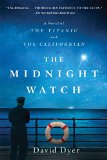Summary | Excerpt | Reading Guide | Reviews | Beyond the Book | Readalikes | Genres & Themes | Author Bio

A Novel of the Titanic and the Californian
by David DyerA Note on the Writing of The Midnight Watch
The Midnight Watch is a work of fiction based on true events. Much of what is described in the novel is the result of careful research and represents my best guess as to what actually happened during the Californian's voyage and afterwards. Other parts of the novel are pure invention, and some parts are a blend of fact and fiction.
John Steadman is entirely my own creation. The Boston American, however, was a real newspaper and was the paper that broke the Californian story by publishing Ernest Gill's affidavit. All quoted newspaper stories and headlines are true, and much of what is said in the novel's various press encounters is taken directly from contemporaneous newspaper reports. I have based my portraits of Philip Franklin, Senator Smith, Sydney Buxton, Lord Mersey, Sir Rufus Isaacs and other minor figures on historical sources, but the IMM Boston agent Jack Thomas is entirely a product of my imagination.
John and Annie Sage and their nine children were a real family who died in the Titanic disaster. Little is known about what happened to them, but what I offer is a likely scenario based on the few facts we have and a close reading of inquiry transcripts.
Captain Lord, Herbert Stone and the other members of the Californian crew were real people. I have tried to offer authentic representations of them, but have added colour and depth with my own imagining of their thoughts and emotions and some elements of their backstories. Their evidence before the American and British inquiries I have taken verbatim from the transcript, with occasional minor alterations for clarity . One liberty I have taken is to attribute to Herbert Stone a fascination with illustrations of Moby-Dick that were not in fact published until 1930. I did this because I love the way these images so powerfully convey the 'heartless voids and immensities of the universe', and the tragedy of a man who did his very best to remain loyal to a flawed skipper.
I encourage readers interested in learning more about 'The Californian Incident' to visit my website (daviddyer.com.au).
Chapter 1
In the early years of the twentieth century my father heard that there was good money to be made in Venezuela. He had reliable information – from a Spaniard who knew a cattle-herder who knew the Venezuelan president personally – that more oil seeps had been discovered and that further concessions would soon be granted. Although I was living in Boston and had profitable work as a journalist, I agreed to go with him. His plan was to explore the seeps, obtain concessions and sell them on. 'A year's work to make a fortune,' he said. He also said my wife Olive and two young children could come too. It would be perfectly safe.
But it was not safe. A month after our arrival my baby son got a fever and a week later he was dead. He was four months old.
On the morning that he died, the local women came to help my wife dress his tiny body and rub red powder into his cheeks. They placed him gently among flowers and candles. Olive would not let me touch the baby: I had killed him by bringing him here, I had no more rights over him. He stayed where he was for the whole day, and then another. I was not allowed to bury him.
On the third day, I took Harriet, our six-year-old daughter, to my father's temporary office – a ramshackle building on stilts a few miles north, along the shore of a swampy, sulphurous asphalt lake. I planned to keep her busy and show her that life went on. We visited nearby seeps, unpacked equipment and spoke to local workers. At dusk we watched lightning dance among the vapours of the lake. The effect was dramatic and unearthly; Harriet squealed and clapped her hands. I was pleased. I wanted her to see that the spark that was no longer in her brother existed elsewhere, that there was energy all around.
Excerpted from The Midnight Watch by David Dyer. Copyright © 2016 by David Dyer. Excerpted by permission of St. Martin's Griffin. All rights reserved. No part of this excerpt may be reproduced or reprinted without permission in writing from the publisher.
Your guide toexceptional books
BookBrowse seeks out and recommends the best in contemporary fiction and nonfiction—books that not only engage and entertain but also deepen our understanding of ourselves and the world around us.